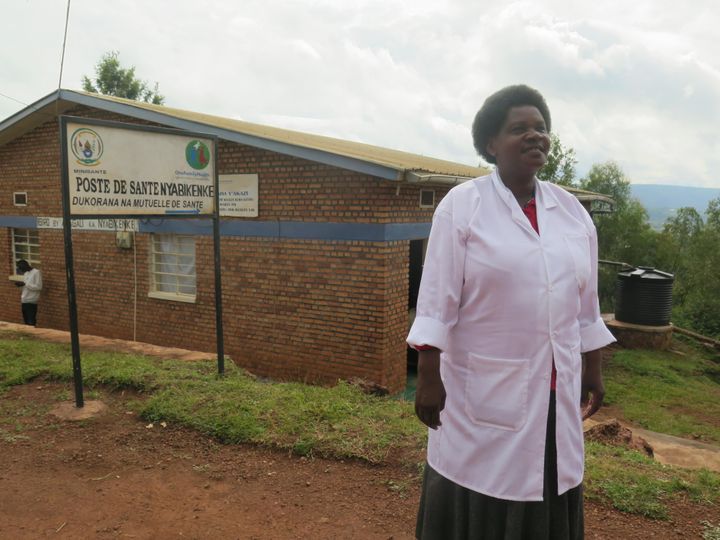In 1978, the Alma-Ata Declaration was signed with the ambitious goal of achieving “Health for All by 2000.” We failed to achieve it. This month, nearly 40 years later, World Health Organization (WHO) members will elect a new Director-General. This person is the chief architect of policies with vital implications on community health and can lead the way toward health for all. In Africa specifically, the best way to achieve this universal health goal is through community health workers.
Right now, many Africans don’t have access to essential care and medicine and there is limited or no fully deployed primary health care system in most African cities. Reasons why include limited domestic funding for health care as well as limited innovation in how Africans access health care under a national health insurance scheme. Furthermore, about 50 percent of Africans depend on the private sector, but donor-funded programs do not direct their funding or provide access to capital.
Community health workers can play an important role for health for all in Africa. They sustain health gains and prevent health challenges by being active in both rural and urban areas. They are present in the last mile where it is usually the hardest to reach those in need. They are trained on promoting good health and hygiene in the community as well as on diseases’ prevention for infants, children and adults.
In 1976, one of Africa’s pioneers in believing in community health workers was a young Kenyan doctor named Dr. Miriam Were. She developed a process where local people worked with their neighbors to promote healthy behavior and tackle diseases. She demonstrated that health promotion and disease prevention norms were developing in the community as a result. In the same year, Dr. Pascoal Mocumbi, a health minister in war-torn Mozambique, designed a successful program to train nurses to perform obstetric surgery in rural areas where there were no facilities for them to find help.
Since then, many countries have neglected the impact and have not provided an adequate policy framework for community efforts and instead built a greater reliance on development assistance for specific diseases at the cost of a holistic health approach. This is not the direction we should go. Africa’s health journey started in the community and to the community is where we must return. Community health workers are the best way to stop preventable and curable diseases early enough to save lives.
We have examples of community programs that work – we just need more of them. One is OneFamilyHealth, a public private partnership with the Government of Rwanda operating 106 heath posts, and 60 per cent are run by women. Since its inception in 2011, more than 1.3 million patients have been served. Euphrasie Mukanturo, a nurse, runs one of these health posts. As a community health worker in Bumbogo, she diagnoses, treats and provides prevention support to about 30 patients a day. Each of them are enrolled in the national health insurance scheme, the government’s pillar to achieve cost-effective universal coverage.
Another example is the work done by Last Mile Health in Liberia. Liberians are being trained to diagnose common medical issues and perform interventions. To deliver on the promise, their CEO Raj Panjabi is using technology to allow for multi-stakeholders to learn, exchange and make a difference up to the last mile.
No matter where they are located, technology is key to the success of community health workers. If they are isolated without access to technology, they can not be as effective. For instance, e-health allows for the creation of a network of community health workers who can share information and gain referrals, and, as a result, save more lives.
When people speak about community health, they may only think about rural areas and assume that cities are fine. But urban areas and their slums also have health challenges. Alexandra, Kibera and Makoko, for instance, host some of the 200 million (2014) Africans who migrated to city slums looking for a better future. This other half will benefit from integrated health systems supported by technology for health tracking purposes. Africa’s middle class and slum dwellers deserve equal access to quality healthcare.
Healthcare is the oil that will keep the wheels of socioeconomic transformation moving forward, so how do we fund a better system?
The African middle-class can donate money, skills and time to assist NGOs and other institutions working in health, particularly those working with community health workers. African private sector employees can give support through volunteering and offering skills programs. Lastly, tax authorities can factor the social and economic value of tax reforms by easing collection, widening the base and most importantly offering tax incentives for individuals investing in enabling sectors, such as health.
While the WHO election is important, Africans must also focus on funding more community health workers who can help Africans and address the health challenges that erode the lives and aspirations of millions. New catalytic investments in people, physical and virtual infrastructure as well as technology are required to finally help us keep the promise made 39 years ago and achieve health care for all.

